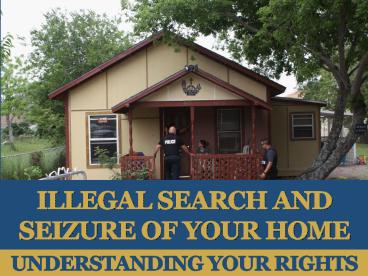Illegal Search and Seizure of your Home - PowerPoint PPT Presentation
Title:
Illegal Search and Seizure of your Home
Description:
This presentation talks about the federal and state constitutional rights regarding illegal search and seizure of your home. – PowerPoint PPT presentation
Number of Views:113
Updated: 2 May 2014
Slides: 20
Provided by:
DerekCassidy
Category:
How To, Education & Training
Tags:
Title: Illegal Search and Seizure of your Home
1
Illegal Search and Seizure of Your Home
Understanding Your Rights
2
Federal and State Constitutional Rights
3
Both the U.S. Constitution and the New Jersey
State Constitution provide us with the right to
be secure in our homes
4
The Fourth Amendment to the U.S. Constitution
reads
5
The Fourth Amendment to the U.S. Constitution
reads
The right of the people to be secure in their
persons, houses, papers, and effects, against
unreasonable searches and seizures, shall not be
violated,
6
The Fourth Amendment to the U.S. Constitution
reads
and no Warrants shall issue, but upon probable
cause, supported by Oath or affirmation, and
particularly describing the place to be searched,
and the persons or things to be seized"
7
Article I, Section 7 of the New Jersey State
Constitution reads
The right of the people to be secure in their
persons, houses, papers, and effects, against
unreasonable searches and seizures, shall not be
violated
8
Article I, Section 7 of the New Jersey State
Constitution reads
and no warrant shall issue except upon probable
cause, supported by oath or affirmation, and
particularly describing the place to be searched
and the papers and things to be seized.
9
Obtaining a Warrant to Search Your Home
10
General rule is that a warrant is needed
Officer must swear out (under oath) an affidavit
which provides the probable cause needed to
obtain the warrant
Judge must sign
Must particularly describe the place to be
searched and the items to be seized
Police can only search for, and seize, items
included in the warrant
11
Exceptions to the Warrant Requirement
12
There are exceptions to the warrant requirement,
including
13
Consent the most commonly used exception. If
you consent to a search of your home a warrant is
not required. Never consent without talking to a
lawyer first
Plain View If you allow the police in for any
legitimate reason, or even open the door for
them, and they see contraband in plain view they
can conduct a search without a warrant
14
Incident to Arrest if an officer has a warrant
that allows entrance into your home to effectuate
an arrest (usually a felony arrest warrant) the
officer may also search the area around you that
is under your immediate control for contraband or
weapons
Exigent Circumstances An exigent circumstance
occurs when an officer has a compelling need to
take action but does not have the time required
to obtain a warrant
15
Exclusionary Rule
16
In essence, the exclusionary rule says that
evidence obtained illegally cannot be introduced
at trial
17
The Fruit of the Poisonous Tree doctrine
further prevents evidence that would not have
been found but for the illegal search from
being used against you at trial
18
LEARN MORE ABOUT SEARCH AND SEIZURE OF YOUR HOME
IN NEW JERSEY
19
- Cassidy Law Firm
- www.thecassidylawfirm.com
- 732-945-5117































